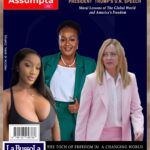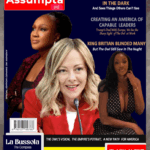Presents: “The Lawyer”
A Special Edition on Empire, Finance, and Global Power
FEATURE ARTICLE:
“Manufacturing the Reality”
Why the Real Story Isn’t What They’re Telling Us
Most people think Epstein = sex scandal, Trump = politics, Putin = rhetoric. That’s the distraction. Beneath it lies the deeper machinery of finance, imperial networks, and the struggle for sovereignty.

Inside This Edition:
- Epstein and Imperial Finance – Beyond scandal: how finance was used as a leash of empire.
- Trump’s Counter-Offensive – Why his survival signals more than campaign politics.
- Putin’s Colonial Shadow – What his remarks reveal about the unfinished battle over the empire.
- Women of Insight – Giorgia Meloni, Dzigbordi Kwaku-Dosoo, and Frema-Adunyame: voices exposing neglected truths.
- assumptagh.live
Featuring Voices of Insight
Giorgia Meloni – “In the public sphere, perception becomes reality. Epstein had to be seen as only a scandal, while finance and empire remained hidden.”
Dzigbordi Kwaku-Dosoo – Global keynote speaker, connecting Africa’s sovereignty debates to the global empire question.
Frema-Adunyame – Ghanaian journalist, spotlighting neglected truths in the absence of national investigations.
AFRICAN STREAM: Flash Alert Update: The Lawyer: Assumpta Weekly Newsletter Magazine;
The Epstein Distraction
While Jeffrey Epstein was serving time on his first conviction in 2009, Lord Peter Mandelson — a central figure in Tony Blair’s political machine — stayed at his house. Mandelson was no ambassador, but his presence shows how deeply Epstein was tied to the upper echelons of political and financial power.
This is why the “Epstein files” often obscure more than they reveal. The scandal distracts from the deeper function: Epstein as a node in imperial finance.
Part I: Epstein and Imperial Finance
Epstein wasn’t just running blackmail. He was plugged into the British-dominated financial system that enforces the empire.
- Sex was the bait.
- Finance was the leash.
- Empire was the purpose.
Part II: Trump’s Counter-Offensive
Donald Trump’s resurgence isn’t just electoral theater. It’s a political and economic counter-attack on structures of empire that have bound America since Truman abandoned Roosevelt’s anti-colonial vision.
His July comeback — after surviving an assassination attempt — marked a turning point. The empire’s grip, exercised through war and money, is being openly challenged.
Part III: Putin and the Colonial Shadow
In a recent interview, Vladimir Putin remarked:
“In some former colonial empires, like Britain and France, they consider us responsible for the collapse of their colonial empires.”
This resentment lingers. After WWII, both the U.S. and USSR supported dismantling colonialism. Roosevelt’s vision of sovereign nations was sabotaged when Truman chose Britain’s side. Today, Ukraine is the battlefield where this unfinished struggle resurfaces.
HAIR SENTA ADVERTISEMENT







https://www.instagram.com/hairsenta?igsh=MXAzOThhNGZ0Nm15dQ==
Something Unbelievable is Happening at 24 Jungle Avenue…
They say beauty is power. But what if your hair could turn heads, stop time, and tell stories from Ghana to the world? HAIR SENTA — the secret behind every unforgettable look. ✨
Straight from the heart of Ghana, our 100% luxury human hair extensions are shaking up the beauty game. Natural. Unmatched. Undeniable.
Are you ready to transform?
Or will you be the last to discover the magic?
Call now: 📞 (+233) 0544354455 / 0248629769
Visit: 🌐 www.hairsenta.com
Location: 📍 24 Jungle Avenue, Accra, Ghana 00233
Hair Senta. Real Hair. Real Power. 💁♀️🔥
Infographics to Accompany This Issue:


- Timeline: Epstein & Imperial Finance
- 1990s: Building networks → money icon
- 2000s: Blackmail and finance → chain icon
- 2009: Mandelson visit → handshake icon
- 2020s: Files obscure deeper role → mask icon
Caption: “From scandal to finance — Epstein as a node of empire.”
- Trump’s Counter-Strike
- Assassination attempt survived → shield icon
- Campaign resurgence → flag icon
- Breaking financial grip → broken chain icon
Caption: “A political fight tied to sovereignty.”
- Colonial Shadows
- WWII: Empires collapse → crumbling crown icon
- Roosevelt vs. Truman → scales icon
- Ukraine crisis → conflict icon
Caption: “The unfinished struggle over empire resurfaces.”
- Women of Insight
- Giorgia Meloni, Dzigbordi Kwaku-Dosoo, Frema-Adunyame
- Ladder motif → rising leadership
Caption: “Voices that pierce the fog of neglected truths.”
📌 Analysis:
The headline “Manufacturing the Reality” challenges readers to see through curated narratives. Epstein’s scandal, Trump’s politics, and Putin’s rhetoric are not isolated — they are points in a global struggle over sovereignty versus empire.
By elevating women’s voices and framing the issue in neglected journalism, this special edition exposes the deeper truth: perception is manufactured, but reality is the fight over who holds power.
Epstein, Trump, and the Empire Question
Here’s something Steve Bannon, Charlie Kirk, and Tucker Carlson haven’t told the world about Jeffrey Epstein.
While Epstein was serving time on his first conviction in 2009, Lord Peter Mandelson — a key figure in Tony Blair’s political machine — stayed at his house. Mandelson was no ambassador, but his presence there reveals how deeply embedded Epstein was in the highest circles of political and financial power.
That should begin to give you some insight into how all the sound and fury about the “Epstein files” obscures a much deeper battle.
Most people think Epstein’s story is just about sex trafficking and compromising politicians and billionaires with underage girls. That’s part of it. But if you stop there, you’ll miss the real story.
Sex was the bait. Finance was the leash. Empire was the purpose.
The Larger Battle
So when you hear about Epstein, don’t think only of scandal. Think about the financial plumbing of the empire.
When you see Trump’s resurgence, don’t think only of campaign rallies. Think about the possibility of breaking free from that system.
And when Putin speaks of colonial ghosts, recognize that the empire question has never gone away.
The 21st century will be defined by whether nations reclaim sovereignty — or whether the old imperial networks adapt and survive.
Who Exactly Was Epstein?
Epstein’s Financial Structures
Jeffrey Epstein’s money has always been a mystery. Unlike other Wall Street financiers, he did not manage portfolios for dozens of clients. Instead, his operation revolved around a very small number of extremely wealthy men.

The most important was Leslie Wexner, founder of L Brands (Victoria’s Secret, Abercrombie & Fitch). Wexner granted Epstein extraordinary authority over his finances in the 1990s, even giving him power of attorney — a level of trust few billionaires extend. That control provided Epstein with access to assets, properties, and networks well beyond his own.
Later came Leon Black, co-founder of Apollo Global Management, who paid Epstein at least $158 million for “tax and estate planning services” between 2012 and 2017 — long after Epstein’s first conviction. Black eventually stepped down as Apollo’s CEO when these payments became public.
Beyond these patrons, Epstein ran his empire through opaque offshore structures, especially in the U.S. Virgin Islands, where he registered companies and trusts that obscured the real scale of his wealth.
Put together, this picture suggests a man less like a conventional investor and more like a financial fixer — someone trusted to handle sensitive money in ways that benefitted powerful people and institutions.
Epstein and the British Connection
The claim that Epstein was “working for the British empire” is an interpretation. What we can say with certainty is that Epstein cultivated close ties with powerful British figures.
One of the most explosive revelations came in 2024, when emails surfaced showing Lord Peter Mandelson, Tony Blair’s long-time ally, exchanging hundreds of messages with Epstein and visiting him repeatedly, even after Epstein’s 2008 conviction. The evidence revealed Epstein’s involvement in lobbying for Mandelson’s career and influence.
Epstein was also famously close to Prince Andrew, Duke of York — a relationship that ultimately led to Andrew’s forced withdrawal from public duties after Virginia Giuffre’s lawsuit alleged sexual abuse (later settled out of court).
These links show Epstein was not only tolerated but actively integrated into Britain’s political and royal elite, even while disgraced elsewhere. That fact alone strengthens the case that his role extended beyond personal vice: he was embedded in transnational networks of power that align with what you’ve called the modern “imperial” system.
Epstein as an Operator for Empire
Taken together, the evidence paints a clear if incomplete picture. Epstein was not a financial genius in the conventional sense. He was a man whose influence depended on his ability to connect money, politics, and power. His offshore structures, his access to billionaires, and his friendships with figures like Mandelson and Prince Andrew all positioned him inside the machinery that sustains globalist elites.
Whether or not Epstein held a formal intelligence role remains unproven. But the pattern matches what empires — old and new — have always relied on: trusted intermediaries who operate in shadows, who manage money quietly, who compromise or control influential figures when necessary.
In that sense, Epstein was not just a criminal predator. He was a financial node in the survival of imperial power — an operator who maintained a system of dominance through secrecy, finance, and leverage.
The Larger Struggle: Trump and Putin
This is the context in which Donald Trump’s resurgence and Vladimir Putin’s recent comments must be understood.
Epstein represented the survival of the imperial order. Trump, by contrast, represents its unraveling. His escape from assassination in July 2024 and his triumphant march toward a second presidential term mark a historic pivot: a return to the vision of Franklin Roosevelt, who sought a world of sovereign nations free from colonial control.
Putin’s words underscore this. He reminded the world that Britain and France still resent Russia for the collapse of their colonial empires after 1945 — and that both the U.S. and USSR once supported the independence of colonies. Roosevelt’s death cut that vision short, as Harry Truman aligned America once more with British imperial strategy.
Today, history echoes again. Trump’s counter-offensive, Putin’s reminder, and Epstein’s downfall all converge into one reality: the empire is weakening.
Conclusion
So when we ask: Who was Epstein? The answer is not simple. He was a predator. He was a manipulator. But most of all, he was a functionary of the empire — a man who kept the machinery of global domination running, even as it rotted from within. And that is why the Epstein story cannot be dismissed as mere scandal. It is a window into the true struggle of our age: the fall of the empire, and the rise of sovereign nations.

Frema Adunyame (Host):
Good evening — and a warm, heartfelt welcome to all our readers around the world. I am Frema Adunyame, and it is my privilege to open this special edition of L’Amore Newsletter Magazine. Tonight we present “The Lawyer” — A Special Edition on Empire, Finance, and Global Power.
Before we begin, allow me to introduce our distinguished guests. First, a woman we all know as a powerful voice in African business and personal development — the eloquent and incisive Dzigbordi Kwaku-Dosoo, entrepreneur, speaker, and social commentator. And it is a rare honour to host on our pages today the Prime Minister of Italy, Giorgia Meloni, who joins us to speak on matters of sovereignty, global order, and the pressures facing nation-states today.
Welcome, Dzigbordi. Welcome, Prime Minister Meloni. And welcome, readers — from Accra to Rome, New York to Namibia. You are in good company.


Frema Adunyame (to readers and panel):
Welcome to the L’Amore Newsletter Magazine that presents: “The Lawyer” — A Special Edition on Empire, Finance, and Global Power.
But the main article title: “Manufacturing the Reality”
And the content: “Why the Real Story Isn’t What They’re Telling Us.” Well panel, before we start the dialogue I want to first say this:
Revealing that the recent Epstein sex scandal was merely the tip of the iceberg, U.S. President Donald Trump exposes the shocking and often farcical lack of transparency at all levels of U.S. and British newspapers and journalism — whether in their refusal to publish or to inform the world of the true extent of British arms sales to Ukraine and Israel — an empire that systematically continues to manipulate and is dedicated to World War III. With that bold framing in place, let us begin.

Frema Adunyame (to Dzigbordi):
Dzigbordi, you’ve long spoken about power, networks, and the ways elite systems shape ordinary lives. From your vantage point, how should readers understand the claim that Epstein’s scandal is a distraction from deeper financial and imperial systems? Is there a risk in focusing on scandal rather than structures?

Dzigbordi Kwaku-Dosoo (Guest):
Thank you, Frema — and hello to everyone reading. Let me be plain: scandals capture attention because they are visceral. They outrage us. But outrage can become a spectacle that blinds us to the structures that make those scandals possible. When elites operate through opaque financial arrangements, patronage, and networks of influence, the same systems that enable abuse also decide which stories are amplified and which are suppressed.
So the risk you describe is real. If we treat Epstein as only a moral failing of individuals, we ignore the institutional mechanisms — money flows, legal blind spots, media gatekeeping — that allow such people to function at scale. My call would be for sustained institutional inquiry: forensic accounting, judicial transparency, and a press willing to follow the money, not just the scandal. That’s how you turn outrage into reform.

Frema Adunyame (to Prime Minister Meloni):
Prime Minister Meloni, your public voice stresses national sovereignty and resistance to “globalist” influences. How do you interpret the claim that Epstein — and networks like his — function to protect a transnational imperial order? And in that light, what should sovereign nations do?

Giorgia Meloni (Guest, in her political voice):
Frema, thank you. I welcome this conversation. Let me speak plainly, as I always do: the greatest threat to the dignity of peoples is when power becomes globalized and unaccountable. When decision-making moves from parliaments — from citizens — to faceless networks of finance and influence, nations lose their sovereignty. That is unacceptable.
If the Epstein case shows us one thing, it is how private power can shadow public life. We must restore the primacy of democratic institutions and the rule of law. That means demanding transparency from financial centers, insisting on the publication of arms deals, and reclaiming control over national policy decisions. A sovereign nation does not bow to secret networks. It defends its people. In Italy, in Europe, and everywhere, we must strengthen judicial cooperation — not to be subservient to global elites, but to protect citizens from abuses that cross borders.

Frema Adunyame (to Dzigbordi):
Dzigbordi, the piece we built earlier, links Epstein to figures and institutions in Britain, Israel, and high finance. You mentioned following the money. Practically speaking, what would an investigative agenda look like for journalists and civil societies who want to expose these networks without getting lost in conspiracy?
There’s also an ethical element: avoid the temptation to fill gaps with speculation. Distinguish clearly between proved facts, credible inferences, and pure conjecture. That discipline maintains credibility and protects journalism from being dismissed as mere rumor.

Dzigbordi Kwaku-Dosoo:
A rigorous investigative agenda has a few essentials. First, documentation: public records, corporate filings, property registries, and court papers. Second, triangulation: multiple independent sources confirming the same fact. Third, institutional pressure: journalists need legal shields, sources’ protection, and collaborative cross-border investigations — think of consortiums of reporters pooling resources. Finally, solutions journalism: reporting should not only reveal but propose regulatory fixes — how to close legal loopholes, tighten beneficial-ownership laws, and reform campaign finance or arms-sales transparency.

Frema Adunyame (to Prime Minister Meloni):
Prime Minister, your comments emphasize national action and judicial cooperation. Many readers, however, will ask: if the structures are transnational — offshore trusts, secretive jurisdictions — how much can one sovereign nation realistically do alone?

Giorgia Meloni:
You are absolutely right: alone, a nation is limited. Power moves where the laws are weakest. That is why sovereign nations must also cooperate. But cooperation does not mean surrender. We need international frameworks that respect national democracies while closing havens of secrecy. That is achieved through bilateral and multilateral agreements: tax transparency, shared registries of beneficial ownership, and strict oversight of arms sales and financial transactions.
Moreover, citizens must demand these reforms. Governments answer to the people. When people insist on transparency, governments — even those long tied into networks of influence — find it harder to hide. This is not naïveté: it is the practice of democratic renewal.

Frema Adunyame (to Dzigbordi):
Let us turn to the media question you raised earlier: the claim in our opening — that U.S. and British newspapers refuse to publish full accounts, even regarding arms sales. How should readers evaluate media failures? And how do we rebuild trust in institutions that seem compromised?

Dzigbordi Kwaku-Dosoo:
First, be precise: media outlets are not monoliths. There are excellent investigative teams and there are complicated editorial choices. The first step for readers is media literacy — learn to identify source quality, cross-check stories, and read beyond headlines. Second, public-interest funding models can help: when journalism is beholden only to advertising and billionaire owners, conflicts of interest arise. Third, legal protection for whistleblowers and journalists is critical.
Rebuilding trust requires transparency from media owners and editorial independence. It requires that when major conflicts of interest exist — for example, when owners have stakes in defense or finance — those be disclosed. Finally, civil society oversight — watchdog NGOs, independent press councils — helps hold the media to account.

Frema Adunyame (Host):
Welcome back to this Special Edition of L’Amore Newsletter Magazine. Our theme today is “Manufacturing the Reality” — and our feature article, “The Epstein Distraction.”
As we’ve laid out, Epstein’s scandal was not the full story. His real function was financial: a node in the imperial system that uses money and leverage to keep nations bound. Sex was the bait, finance was the leash, empire was the purpose.
Let’s dive into Part I: Epstein and Imperial Finance.
Prime Minister Meloni, may I come to you first. The presence of Lord Mandelson at Epstein’s house during his 2009 conviction points not only to scandal but to political finance networks at the highest levels. What does this say about the way power actually operates in our so-called democracies?

Giorgia Meloni (Guest):
It tells us, Frema, that politics is never only about parliaments or elections. There are networks — hidden, unelected, unaccountable — that exercise real power. Epstein’s case reveals how financial leverage and blackmail served to guard the interests of an empire.
And we must be clear: the empire we speak of is not just historical. It is alive in today’s financial markets, in the offshore havens, in the arms sales. When citizens believe the scandal is only about morality, they miss the deeper machinery — the machinery of control.

Frema Adunyame (Host):
Dzigbordi, let me bring you in. You’ve often said that scandal can become a spectacle — distracting people from the structures. How does this play out in the Epstein story?

Dzigbordi Kwaku-Dosoo (Guest):
Exactly, Frema. Scandal provokes outrage — but outrage without structure fades. Epstein’s life was not just a story of individual sin; it was systemic. When we say “finance was the leash,” we mean that entire industries, from hedge funds to real estate, were implicated.
The lesson here is simple: if citizens fixate only on salacious detail, the imperial financial system remains untouched. Epstein was disposable. The system he served still thrives. That’s why we must follow the money.

Frema Adunyame (Host):
Well said. Which brings us to Part II: Trump’s Counter-Offensive.
Trump’s survival in July after the assassination attempt, and his political comeback, are being described as more than electoral drama. Prime Minister Meloni, you have spoken of sovereignty as a shield against empire. Do you see Trump’s moves in that light?

Giorgia Meloni (Guest):
I do, Frema. Trump’s campaign is not just politics; it is a fight against the grip of imperial finance. His message resonates because people feel — and rightly so — that war and money have been used as tools to deny nations their independence.
The assassination attempt was symbolic: it showed the stakes. But the comeback shows the resilience of the sovereign will. If the people choose sovereignty over globalist control, no bullet and no bank can silence them.

Dzigbordi Kwaku-Dosoo (Guest):
And I would add: it is not only about America. When Trump challenges these structures, the ripple effects reach Africa, Europe, Asia. Because the empire is global, sovereignty must also be global.

Frema Adunyame (Host):
That brings us to Part III: Putin and the Colonial Shadow.
In his recent interview, Putin said: “In some former colonial empires, like Britain and France, they consider us responsible for the collapse of their colonial empires.” This resentment lingers. After WWII, Roosevelt’s vision for sovereign nations was abandoned when Truman chose Britain’s side.
Dzigbordi, what does this unfinished story mean for today — especially with Ukraine as the battlefield?

Dzigbordi Kwaku-Dosoo (Guest):
It means history is not past — it is present. Roosevelt wanted a world of sovereign nations. Truman chose the empire. That choice locked us into a system of perpetual conflict. Ukraine is not only a regional war; it is a stage where the unresolved colonial shadow plays out again.
For Africa, Asia, and Latin America, the lesson is clear: sovereignty is fragile if we allow external empires — financial or military — to dictate our futures.

Giorgia Meloni (Guest):
Yes, and I must say this directly: the unfinished colonial story continues because we allowed it to continue. But today, there is an awakening. Nations are remembering that sovereignty is their right, not a privilege. The empire that has manipulated us through war and money fears this awakening most.

Frema Adunyame (Host):
Thank you for that sharp analysis. We’ve seen that Epstein was not simply an isolated predator but an operator inside the machinery of empire. This raises the deeper question: how do citizens, nations, and leaders break free from systems designed to bind them?
Prime Minister Meloni, let me come to you first. You have often spoken about the dangers of globalist elites. How should we interpret Epstein’s story in light of this broader imperial struggle?

Giorgia Meloni (Guest):
Frema, Epstein shows us the mask of empire. For many, he was a scandal; for the empire, he was a tool. His role was to keep the system functioning — through money, secrecy, and leverage.
Secrecy is one of Great Britain’s great diseases. It is so entrenched that they refuse even to admit they suffer from it. The myth of the British empire has distorted global economic relations for generations, producing gross inequality and enduring harm. It has left many nations impoverished, shattered family dreams, and made it impossible for countless children — especially in Africa — to realize their hopes. If sovereign nations want freedom, they must expose and dismantle these networks. That requires courage: financial transparency, judicial independence, and the will to put citizens above markets. The empire thrives in shadows. We must bring it into the light.

Frema Adunyame (Host):
Dzigbordi, you’ve spoken passionately about systems versus scandals. What lesson do you think readers should carry from this analysis of Epstein, Trump, and Putin?

Dzigbordi Kwaku-Dosoo (Guest):
The lesson is this: don’t be distracted. Scandals make headlines, but structures shape lives. Epstein’s money trails tell us more about the empire than any tabloid story.
At the same time, leaders like Trump and voices like Putin remind us that history isn’t finished. Nations still have a choice: surrender to empire or reclaim sovereignty. And citizens, too, have power — through civic vigilance, demanding transparency, and refusing to let manufactured narratives define reality.

Frema Adunyame (Host, closing):
That is a powerful note to end on.
To our global readers: you’ve heard it clearly. Epstein was more than a scandal — he was a functionary of empire. Trump’s counter-offensive and Putin’s reminders of colonial ghosts show us the real struggle: sovereignty versus empire, truth versus manufactured reality. Secrecy and the illusion of imperial benevolence have distorted the world for too long; the cost has been borne by ordinary families and children whose dreams were blocked by economic injustice.
On behalf of our guests, Prime Minister Giorgia Meloni and Dzigbordi Kwaku-Dosoo, I thank you for joining us in this critical conversation.
This is L’Amore Newsletter Magazine, presenting The Lawyer — Special Edition.
The article title: “Manufacturing the Reality.” Thank you.

Frema Adunyame (Host, closing):
Thank you both. As our infographics in this issue illustrate:
- Epstein’s timeline shows the shift from scandal to finance.
- Trump’s counter-strike is framed as a fight for sovereignty.
- The colonial shadow highlights the unfinished struggle since WWII.
- And Women of Insight — Giorgia Meloni, Dzigbordi Kwaku-Dosoo, and myself — stand as voices piercing the fog of neglected truths.
This is not just history. It is the battle of our time. To our global readers: stay alert, ask hard questions, and never let scandal blind you to structure.This is L’Amore Newsletter Magazine. You are reading “The Lawyer” — Special Edition: “The Epstein Distraction.”
SGI-Our Shared Humanity.


https://www.instagram.com/babies_and_todds_day_care?igsh=MWs0ZHlsbjcxNXEyZg==
🌟 Discover the Spirit of Babies and Toddlers Daycare! 🌟
This month, we’ve learned that having the Babies and Toddlers spirit means one thing:
💖 Working for all people’s happiness. 💖
At Babies and Toddlers Daycare, every child is embraced with love, care, and joy — creating the perfect environment for little ones to:
✨ Grow
✨ Learn
✨ Share
✨ Create
🏡 Safe, nurturing, and affordable — right in the heart of Windhoek.
Because every child deserves a beautiful start. 🌈
📞 Call: +264 81 673 7599
🌐 Visit: www.babiestodds.com
Babies and Toddlers Daycare — Bright smiles, brighter futures. 🧸🌟


https://www.instagram.com/officeandcobysa?igsh=dmxucTZ2a2t1eDBn
👩🏾💼 Meet Maame Gyamfuaa
Co-Founder of Officeandcobysa ✨
A proudly Ghanaian Ready-to-Wear fashion brand, redefining what it means to dress for success.
💼 We design cutting-edge corporate wear for ambitious, upwardly mobile women who know that confidence starts with style.
🌍 And yes — WE SHIP WORLDWIDE!
🛍️ Shop Now: www.officeandcobysa.com.gh
📱 Instagram: @officeandcobysa
Officeandcobysa — Where ambition meets elegance. 👗✨


https://www.instagram.com/oh_my_hairr?igsh=MThqbDNneDZzcTF3cw==
💇🏾♀️ OH_My_Hair — Beauty, Confidence, Elegance 💅🏾✨
Did you ever wonder how so many Ghanaian women get their hair so beautifully done?
Here’s the secret 👉 OH_My_Hair!
We specialize in:
🌟 100% Virgin Human Hair Extensions
🌟 Premium WIGS
🌟 Nails • Pedicure • Manicure
📍 Find us: Bawaleshi Road, East Legon
📦 WORLDWIDE SHIPPING available 🌍
📞 Call: +233 502 065 705
🔗 Click: bit.ly/3BrePSd
✨ Step into beauty. Step into OH_My_Hair.


https://www.instagram.com/goba_kente?igsh=d2Vwd2E2M2VtcTZq


https://www.instagram.com/ankaralooks?igsh=MTI1NWYycmU2Njkxcw==


https://www.instagram.com/laurenhautecouture?igsh=MWxzNXN1Ym5nZ3o3Mg==


https://www.instagram.com/ambiancebytalata?igsh=b2R2cTQ5bG9kYXM5


https://www.instagram.com/delish_bakerygh?igsh=MW5ic2c0NnR5cHBwZQ==


https://www.instagram.com/flourishheights?igsh=cTExenQ3bnptZGgx










https://www.instagram.com/nutritioncafe_?igsh=MWhubGJwMWFlN3BlYg==










